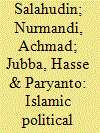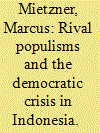|
|
|
Sort Order |
|
|
|
Items / Page
|
|
|
|
|
|
|
| Srl | Item |
| 1 |
ID:
160538


|
|
|
|
|
| Summary/Abstract |
Indonesia’s banks and financial markets have developed considerably over the twenty years following the country’s devastating financial crisis of 1997–98. Government policy has balanced a variety of objectives involving the financial sector, such as seeking growth, financial inclusion, and stability. Recent data shows that financial stability indicators are mostly robust, suggesting a relatively resilient banking sector. Also, interventionist policies under the government of President Joko Widodo, aimed at promoting financial inclusion and growth, have so far not been excessively costly. However, a degree of inefficiency may be the price to pay for financial stability. This article explores some of the policy and structural sources of inefficiency in the banking sector as they have developed over recent years. It shows that Indonesia’s banking sector is structurally segmented, with limited competition among the largest banks and a competitive —but constrained—mid-size bank segment. Foreign takeovers of existing banks are a possibility, but that does not necessarily improve banking sector performance. Alternative sources of finance and vehicles for private saving in Indonesia may reduce the impact of the inefficiency.
|
|
|
|
|
|
|
|
|
|
|
|
|
|
|
|
| 2 |
ID:
175076


|
|
|
|
|
| Summary/Abstract |
This article analyses the polarisation of Islamic groupings in Indonesia which have taken place since 2017. It reviews the situation from the 2017 gubernatorial elections in Jakarta and the incident of the Ahok Video, during which the various Islamic factions were united, up to the 2019 elections, during which they polarised around the different presidential candidates and were unable to present a united front. This article analyses the division of Islamic groupings in Indonesia into traditionalist, fundamentalist and modernist, and looks at the interactions within them and between them on social media towards the 2019 campaign to better understand their positioning.
|
|
|
|
|
|
|
|
|
|
|
|
|
|
|
|
| 3 |
ID:
173155


|
|
|
|
|
| Summary/Abstract |
Viewed as a stable democracy for much of the 2000s and early 2010s, Indonesia has in recent years been part of the global populist surge. In fact, national politics has been marked by competition between three rival populist streams: chauvinism, Islamism and technocratic developmentalism. This article discusses the conditions under which such a three-track populism could emerge in Indonesia. In identifying the drivers of populism, it points to the existence of a major religio-political cleavage, the framing of that cleavage in a narrative of economic inequality, the easy targeting of cultural minorities, and the collaboration of established parties. Drawing from survey data to substantiate its claims, the discussion demonstrates that populist attitudes are spread widely across the ideological landscape; that its intensity is highest at the extreme ends of Indonesia’s Islamist-pluralist spectrum; and that populist citizens are more concerned with purported threats to their identity than the kind of politico-economic hardship that much of the classic populism literature has focused on. Most importantly for Indonesian democracy, the three types of populism have interacted among each other, and with the non-populist political establishment, in a way that has severely undermined the quality of the democratic polity.
|
|
|
|
|
|
|
|
|
|
|
|
|
|
|
|
|
|
|
|
|